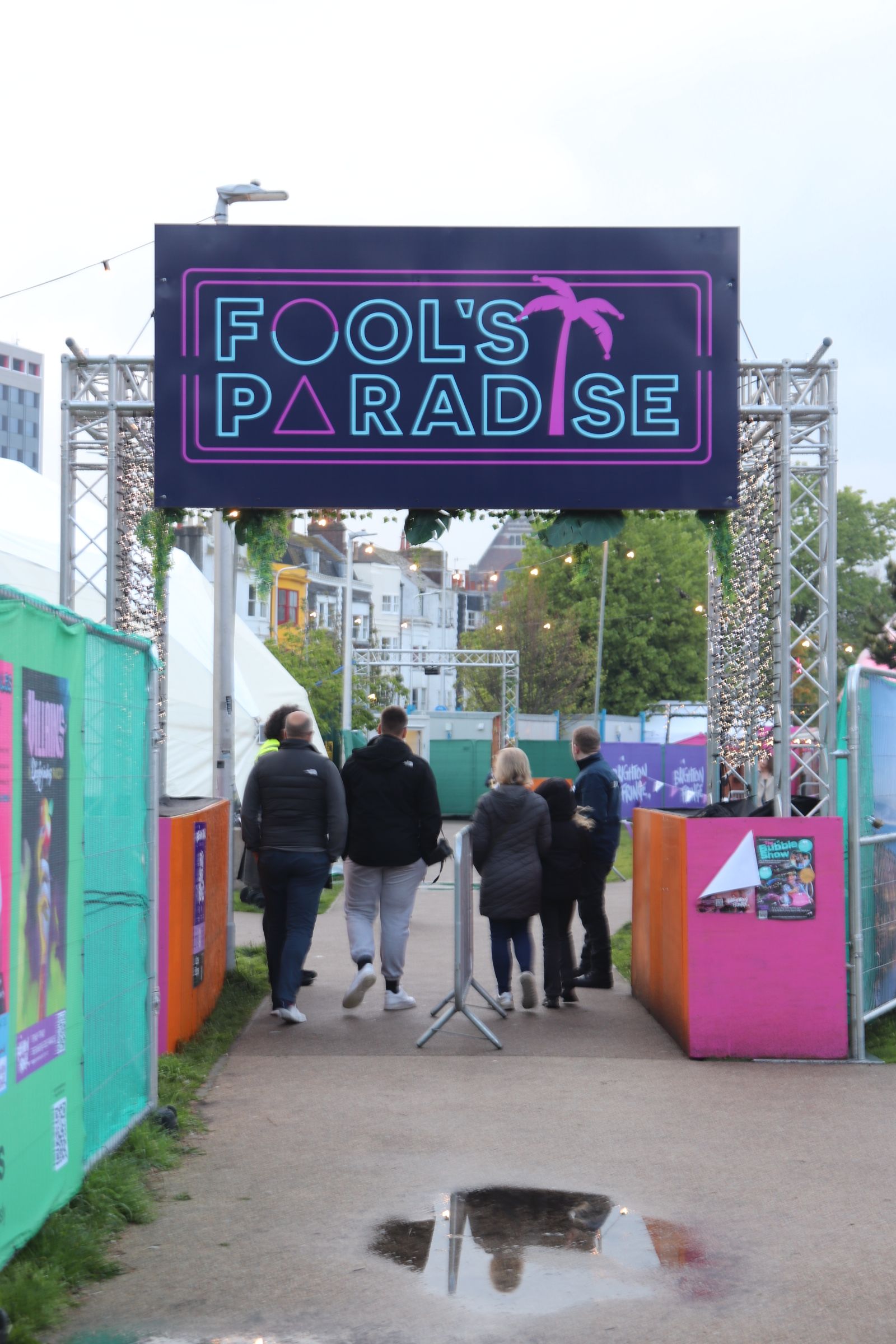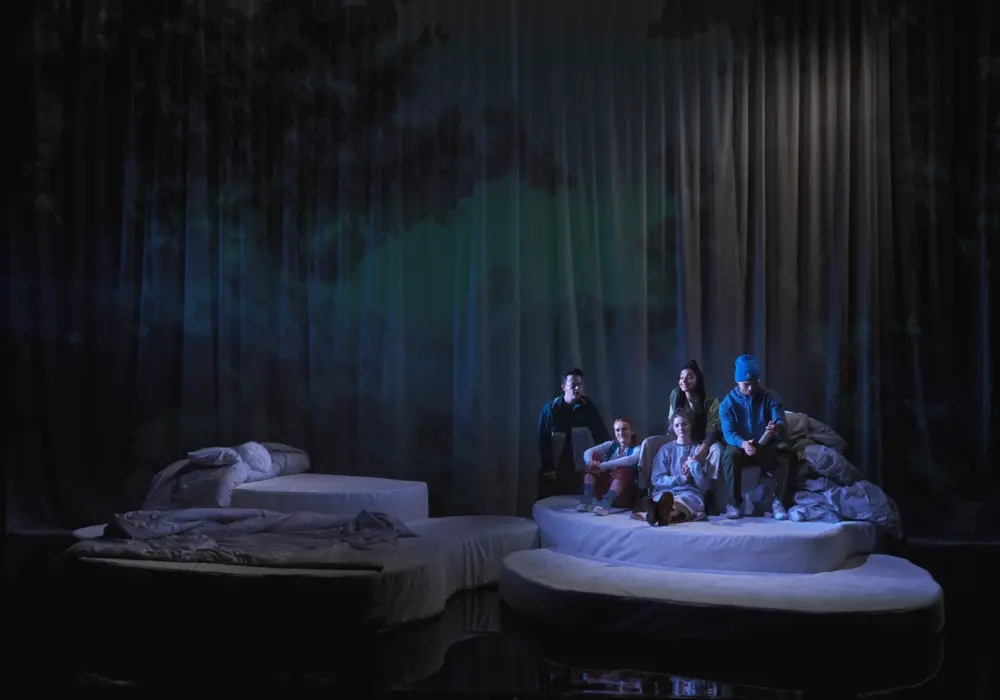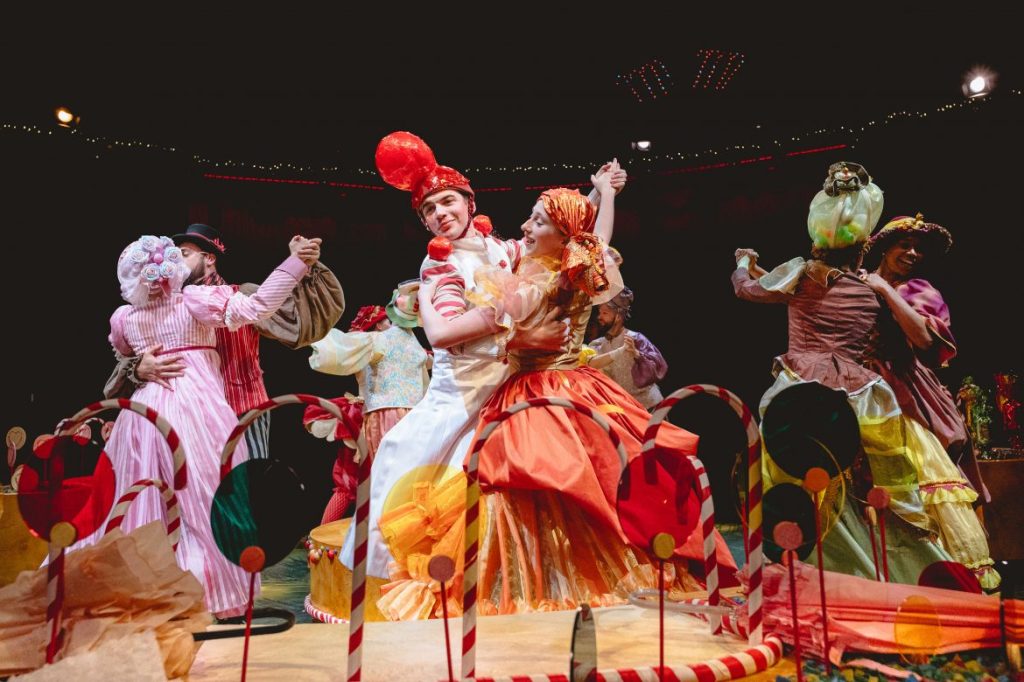Monday 13th May:
Week 2 starting now, so another look at what’s coming up.
The mid-week headliner I have for you is Blue Blood (or “how to kill your way to the top”). Blue Devil Theatre have had a lot of hits, and this one had a good run at Brighton Fringe last year and has performed in many locations over the south since. They are back for one performance this Wednesday on May 15th Brighton Open Air Theatre at 7.00 p.m. This is a full-length production, but it looks like the weather gods have been kind. If you’ve always wanted to see how exactly to get from ninth in line to first in line the fast and direct way, now’s your chance.
If you’re a fan of Michelle Yim’s East Asian stories, you might like The Empress and Me on Tuesday and Wednesday at 6.0p.m. in the Rotunda. This is more a piece of historical interest than Mulan, but it does go into a lot of nuanced about the life of Princess Der Ling, in the early 20th century when American and Chinese civilisations were just starting to cross over.
For fans of Malcolm Galea’s Plastic and Chicken Bones, this week you can see his follow-up play The Trials of Magnus Coffinkey. This, again, looks set to work very heavily on world-building, but this time it’s a fantasy setting, where the titular character must complete a strange quest with harshly high stakes. A two-hander this time, but definitely worth checking out after seeing what he achieved before. Starts of Thursday at 9.00 p.m. at The Lantern.
And one final thing to mention is And I’ll Blow Your House Down. I haven’t seen this before and don’t know much about it, but I’ve heard good things about it from multiple sources. It’s a clowning show, but on the not terribly cheery subject of life-changing disability diagnoses, and a not terribly flattering verdict on how society reacts to this. Two performances on Thursday 7.45 then Friday 6.15 at Rotunda.
And that’s it. Stay with us for the same thing Friday, but plenty of stuff to keep you busy before then.
Sunday 12th May:
But now, a quick break from Brighton coverage to return to the big Edinburgh question. It’s 3,224 registrations. It is not entirely clear is there’s going to be another batch added before next month’s paper programme launch – my reading of the deadlines is no, but there’s a bit of ambiguity. One thing is certain though. If you’re measuring the size of Edinburgh Fringe by the number of registrations in the paper programme, it’s not gone down. We are already past 2023’s number of 3,097.
One thing we don’t yet know – at least, not without a lot of laborious analysis – is whether there are more short runs (i.e. less than the full three weeks) than last year. That could still make the fringe smaller if you measure it by performances. I have heard some anecdotal observations claiming this might be the case. But be careful – there have been many times previously when this pattern had been claimed, but when someone did the number-crunching, there turned out to be no change. If you do want to check this yourself, bear in mind that short runs isn’t a new thing – there has always been a fair number of shorter runs, especially in theatre.
Should there not be in increase in short runs, however, the question instead is: okay, Edinburgh fringe is bigger, but at what cost? There are already anecdotes that a lot of artists aren’t comfortable with gambling more money than they can comfortably afford to lose, but feel they have no choice by to do Edinburgh in order to be taken seriously. How much are they being forced to pay for accommodation. Edinburgh Fringe has secured hundreds of beds at Queen Mary University in Musselburgh. But the number of performers seeking accommodation is thousands, not hundreds. There is also the “keep it fringe” fund. Is this enough to keep Edinburgh Fringe affordable. Or are we driving out talent in favour of kids with trust funds?
I hope that people with better resources to investigate and ask questions don’t let this go. Affordability is by far the biggest problem at Edinburgh, and it’s not clear how close we are to a solution. But the worst solution would be to stop calling it a problem. And as long as the “Edinburgh or bust” mentality persists, I don’t see what the solution can be.
Saturday 11th May:
 Damn it. I missed one in the recommendations. The Foundry Group – with their big back catalogue of successful plays including Big Daddy versus Giant Haystacks, Jeeves and Wooster send-up Lord God and 2022’s OffFest winner Underdogs is back with a new play: Great Britons. It looks like a spoof of the TV documentaries of the same name, except all these famous historical events are being done on a tiny budget. Not all of Foundry Group’s plays are out-and-out comedies, but this one clearly is, and when they set out to be funny, they’re very funny.
Damn it. I missed one in the recommendations. The Foundry Group – with their big back catalogue of successful plays including Big Daddy versus Giant Haystacks, Jeeves and Wooster send-up Lord God and 2022’s OffFest winner Underdogs is back with a new play: Great Britons. It looks like a spoof of the TV documentaries of the same name, except all these famous historical events are being done on a tiny budget. Not all of Foundry Group’s plays are out-and-out comedies, but this one clearly is, and when they set out to be funny, they’re very funny.
This does actually bring me on to one of my gripes related to no programme, no app, and a website with design issues. It used to be very easy to scan listings by companies with the paper programme, but it’s next to impossible to do it with the way Brighton Fringe’s website is currently designed. The only way of doing it is by looking through all 700 registrations and seeing if you recognise any of the names. Most annoyingly, this only seems to happen with Brighton Fringe. Edinburgh Fringe and Buxton Fringe both display company names quite prominently when looking through the listings.
Out of all of the issues I have with the website, this one I think does artists the biggest disservice. Seeing the name of a company I know and trust is a far more reliable indication of a show being worth seeing than a eye-catching image or tagline. I can’t believe I’m the only person who would loved to have seen The Foundry Group but didn’t know they were on – failing that, that must surely apply to other companies. If you’ve made progress and built a reputation, the website as currently designed almost ensures this counts for nothing. That is not fair.
The website might not be the cause for breakaway venues as I first thought it might, but it’s still causing all sorts of easily avoidable problems. Add this one to the list.
Friday 10th May, 10.45 p.m. – Plastic and Chicken Bones:
One last review whilst I’m on the train home. I won’t repeat this review all over again, because I sang its praises enough two years ago, but it’s every bit as good as I remembered – with a few rough edges filed down.
You can see the original review for a fuller explanation of the play, but the premise was that “Dryskoll” – who we learn as time goes on is a body-hopping time traveller – wakes up to find himself stranded in 2024, where the atmosphere is a lot of colder than he’s used to, but the good news is that most of the planet is habitable. He has been stranded after a time-travelling mission gone wrong, but before we hear about that, we hear how all-benevolent supercomputer “Zimmy” saves humankind from worldwide catastrophe and led them into a new golden age. With a catch.
You need a good memory to notice the changes between the 2022 and 2024 versions, but if you have on, the main different is that it’s made clearer what’s storytelling and what’s the frantic conversations between Dryskoll and Zimmy, managed through both changes of lighting state and changes in acting mannerisms. Plastic and Chicken Bones does, however, remain a predominantly storytelling piece, and can’t really be anything else – the complex world-building of a seemingly benign far future and the nightmarish intermediate future is something that can only be done through narration in a play of this length.
If there’s one thing left unaddressed that I wish had been addressed, it’s clarifying who Dryskoll is actually speaking to during the storytelling. It is implied that he’s telling his story to a 2024 audience who have to be broken the news of what’s coming down the line, but how that comes about is never explained. This wouldn’t be an easy thing to write into the script, but the reason I would look into it is that this makes a difference to the end of the play. I won’t explain why as it’s a spoiler, but it does matter whether Dryskoll can tell his story in the present before it’s too late. But this is a moot point. Plastic and Chicken Bones got numerous five-star ratings last time and this is just a matter of how high this goes up the five-star scale. Runs until Sunday at the Lantern at 9.00 p.m. Don’t miss it this time.

Friday 10th May, 8.15 p.m.:
And that’s the end of visit 1. I have one outstanding non-embargoed review which I hope to get out later tonight on the long train journey home.
Just one bit of breaking news: I bumped into Fringe Chair Duncan again just after my last play, and took the opportunity to ask how ticket sales are going. The current mood is it’s pretty good, with targets hit several weeks early. One thing that does seem to have changed is that buying patterns have shifted a bit towards audiences buying tickets in advance. For a couple of years, there had been nerves with only a handful of tickets sold in advance, with almost everything bought on the day (or not). Now, it seems that there’s some return to advance sales, though no-one’s suggesting it’s back to where it is before.
Usual caveat applies: ticket sales figures are volatile. Julian Caddy refrained from giving too many figures of sales compared to this time last year because it varied a lot from day to day. I guess one variable that needs accounting for is whether the good figures are really better ticket sales, or just the same number of tickets sales but sooner. However, at this stage I can at least report the mood which is: so far, so good.
Friday 10th May, 9.45 p.m.:
We’re coming into weekend two, so it’s time once again to have a look at what’s coming up. Settle down, this is a long list.
My headliner for week 2 is Coleridge-Taylor of Freetown. Tayo Aluko impressed me with Call Mr. Robeson a few years ago. All of his plays are black historical figures, but this focused heavily of counter-intuitive history: a black singer who commanded enormous respect across the board and stood up to segregation – only to find his career threatened by a different bit of public hysteria (that, for once, had little to do with race). So it will be interesting to see this one. It’s not the really famous Coleridge-Taylor who did the Ancient Mariner poem, but his nephew seeking an academic career in Sierra Leon only to get caught up in a local conflict. First half of a split run starts today, running until Sunday at 7.30 p.m. at the Rotunda.
For something a lot more off-the-wall, I recommend Identity Theft from Stolen Table, whose The Lost Play of Barry Wayworm last year. I think the new play is going to be on the same format, so don’t try to make sense of the story, because it’s not supposed to make sense. What you do get a lot of, however, the excellently-choreographed clowning, in particular from Agnes Carrington, who is returning in this play. Saturday 10.30 p.m. and Sunday 8.00 p.m. at Bar Broadway.
If you want straight comedy, you can’t go wrong with Crime Scene Improvisation. There are many improvised plays now, but this team have worked together for a long time and it shows. And this brings democracy to murder investigations, where the identity of the murder is decided by an audience vote – and the newly-unmasked killer must make an impromptu confession. Two performances tomorrow at 3.30 and 6.00 p.m. at Komedia, with a return on the final Saturday.
If you are looking for a family-friendly event, I recommend Let’s Dance, who rose to headliner status in the infamous 2020 Brighton Fringe where outdoor theatre was suddenly all rage. They do ballet, but is it very unpretentious and very accessible ballet, which tends to feature all of the best-known classical tunes. This year, however,Goldilocks has 1940 theme, so who knows, there might be some roaring forties bangers too. Regardless, it’s a lovely afternoon event for anyone, and a good introduction of old music for children. Brighton Open Air Theatre on Sunday at 11.00 a.m. at 2.00 p.m.
Headache is a Rotunda play seen this year and won’t be getting a full review after the fringe, but I’m going to give this one an early shout-out because this is an impressive debut from Tanieth Kerr. It’s based very heavily on her own real experience of getting the news her father suffered a brain injury in an accident and the struggles over getting on with a normal life with this going on in the background. Next performance coming up Sunday at 3.15 p.m.
And finally, utopian (terms and conditions apply) future storytelling Plastic and Chicken Bones, and Character Flaw about living with ADHD are both continuing their runs until Sunday. This list has got long enough, so scroll to Tuesday 7th May, 3.30 to read more about those is you haven’t already. Plastic and Chicken Bones now at 9.00 p.m. at The Lantern, and Character Flaw is 6.30 p.m. at The Actors.
Enjoy.
Thursday 9th May, 9.00 p.m.:
One thing I’ve not looked at that much yet but is worth mentioning is the arrival of “Half a Camel Productions”. This is mostly – but not exclusively – affecting the comedy listings. If you regularly go to the comedy but have no idea who Half a Camel are, that’s because they have been staying under the radar quite a bit. I’ve been doing spot check of the relevant listing on Brighton Fringe and there’s no mention of them. However, go over to their own website and there’s easily over a hundreds listings, maybe over two hundred. There are five different pub venues they use, including, most notably, The Caxton Arms. (There is a complication that not all of the listings here are registered with Brighton Fringe, but that’s a complication for another day.)
What is not clear is just who or what Half a Camel actually is. There’s nothing on their website to say what they are, just that they have lots of performances going on at Brighton Fringe. It’s possible they’re taking responsibility for programming at various pub venue. Or it might be something else. I will try to make sense of this as and when I get more information. In the meantime, it may well be the case that Half a Camel is the most powerful playing in Brighton Fringe that you’ve never heard of.
Thursday 9th May, 6.45 p.m.:
Right, enough arsing about. Four-play day today. Halfway through. Will get back to you later.
Wednesday 8th May, 10.00 p.m.:
Again, apologies that reviews are only trickling in. I always see shows at a more relaxed pace when performing (over a longer period), but the combination of this plus embargoing Rotunda plays (which now accounts for a lot of theatre) means there’s not much I can share right now.
Anyway, one bit of big news tomorrow is the third release of Edinburgh Fringe tickets – and this time, the third batch is the final batch for paper programme inclusion. Last year, the number of registration in time for this deadline was 3,097. At the moment, we are on 1,680. That appears to be ahead of the second batch this time last year, but that could mean anything, not least it could be acts getting in registration early because of the much more pressing task of getting scarce accommodation early. (Reminder of the caveat: missing out on the paper programme isn’t as big a dead as it used to be – post-deadline registrations may still skew figures.)
Usually, I know the data before. This time I don’t. Whatever the number is tomorrow, it will be newsworthy – I just don’t know what sort of news. And whatever happens will have implications for Brighton Fringe too.
We’ll see tomorrow.
Wednesday 8th May, 10.30 a.m.:
Okay, I’m making some progress in terms of understanding what’s going on. I went to the Brighton Fringe networking event last night, and got to speak to the new chair of Brighton Fringe board of Trustrees, Duncan Lusting-Prean. I now have a better idea for two things where previously I’ve only had a vague inkling.
First, a catch-up on where we are. Brighton Fringe only survived 2020 because of a bailout by The Pebble Trust. However, a condition of the bailout is that they would take over the board of Trustees. They reason they gave was that it was easier for the people directing Brighton Fringe to be the same people funding it as long as it was in bailout mode. They said they would step back when funding was no longer needed, and they kept their promise, and Duncan Lusting-Prean became the Chair. Then chief executive Julian Caddy left for Scarborough Fair – but due to Caravanserai backfiring financially, and leaving Brighton Fringe short of money again, recruitment of a replacement was put on hold, with Duncan taking on the role of “executive chair” until further notice.
Starting with this less contentious topic: this interim setup without a chief executive is becoming permanent. The short-term reason, I understand, is that you wouldn’t be able to recruit someone with enough skills with the salary Brighton Fringe can currently offer. However, the current trustees and staff appear to have come to a consensus that they like this more decentralised setup, with no single person having the lion’s share of the influence. Some roles have been upgraded to cover roles formerly covered by CEO, and, as I understand it, most the work currently done by the trustee chair will also be covered by regular staff in time for the next change of trustee chair. So unless future trustees/staff change their mind, the CEO position looks like it’s gone for good.
The other topic is what’s going on with Spiegeltent. I am extremely hesitant to publish all the details here, as things are clearly coming to a head and I’m reluctant to write one set of claims before I know what the counter-claims are. What I think I can safely say is that (short of a wildly conflict account from the other side), this is NOT about Caravanserai any more. Nor is it about its sort-of replacement Fool’s Paradise. The arguments have moved on. And it’s not the website either. Instead, it’s down to venue agreements. And, so far, Brighton Fringe is not budging on the area of dispute.
What I can say is that I honestly don’t know which way this will go. Things could calm themselves down, or things could get messier. I hope the next post about this will be a route to compromise and de-escalation. But it might go the other way.
Tuesday 7th May, 3.30 p.m.:
We’re now in week 1, so let’s have a look at what’s coming up.
The absolute must-see this week is Plastic and Chicken Bones (formerly called 0.0031% Plastic and Chicken Bones). It’s borderline between storytelling and theatre, but what storytelling it it. Malcolm Galea’s story of a time-traveller sent from the future by a benevolent-but-maybe-not-that-benevolent supercomputer rule is one of the finest crafted stories I’ve seen, both the plot itself and the worldbuilding behind the tale of a future where everyone is immortal. If you didn’t catch it in 2022, you can catch it now, at The Lantern. First performance this Thursday is 5.00 p.m. and the Lantern, then 9.00 p.m.
Today and tomorrow are the first two performance of The Ballad of Mulan. Grist to the Mill’s proudly “undisneyfied” version does actually have a lot in common with their smash hit World War One play, The Unknown Soldier. Social code of what nice young ladies are expected to do with their lives features, but the much stronger theme is war, from the camaraderie amongst the ranks to the horrors of the battlefield. Today and tomorrow at 6 p.m., Rotunda.
And the big name starting this week is Philippa Dawson with her Brighton Fringe Award for Excellent winner Character Flaw. The play is very firmly on the single subject of what it’s like to have ADHD, but it’s told the way it should be told: not an affliction to suffer from, but just part of who you are. Starts Thursday 6.30 at The Actors.
And also at The Actors is Can’t Stop Carrying On which I’ve just reviewed below. Again, tonight and tomorrow at 6.30. Don’t miss it.
Tuesday 7th May, 9.30 a.m. – Can’t Stop Carrying On:
So, ignoring the fact that I messed up my schedule, the play I did see last night was one of my “lucky dip” picks. I want to see something at a particular time, look at the few things available that class as theatre, and pick something from that – usually something I’ve never heard of before. It does sometimes cause me to pick something abominably awful, but there’s not joy greater than picking something excellent. This is one of these times.

Can’t Stop Carrying On follows the life of its creator Peter Rogers. (Or, to set up the opening groaner, he says he popped away for a pee, and then adds “P” to the sign of “ETER ROGERS”.) It is 1978, Carry on Emanuelle has just gone to the cinemas, and for the first time in decades there is no Carry On film in production. To an outside observer, it’s clear that the Carry On franchise has run out of steam. It was probably doomed when they decided keeping up with the times meant saucier humour and more tits, only to be out-porned by the shit Confessions films, and Emanuelle was a big error of judgement that proved to be the final nail in the coffin. But Peter Rogers is not giving up that easily. He’s already got plans in place for Carry on Again Nurse. If he can get enough of the team to take part – and the pool is getting smaller.
There is a little bit of confusing monologue at the beginning, until you realise this is actually a conversation between Peter Rogers and Kenneth Williams. I was wondering why they didn’t just have two people on stage, but Darren Haywood, playing both Peter and Kenneth, will in time play most of the Carry On team. Be VERY careful committing to something like that: the you probably end up confusing the hell out of your audience if you don’t 100% know what you’re doing. But Blue Orange Theatre does. Darren Heywood works very hard to get the mannerisms of all the Carry On actors distinguishable from each other, but there’s only so far the audience can keep track of this – especially those who aren’t too familiar with who’s who. That is where James Nicholas’s writing comes in. He makes sure there’s just enough refreshers written in the script to show you which characters are currently in conversation.
One such refresher that needs to be dropped in when Sid James pipes up, whereupon it’s pointed out he died in 1976. Sadly, we’re going to have to get used to this. Whilst popular culture has moved on to alternative comedy such as The Young Ones and Rogers is making a futile attempt to produce Dallas parody Carry on Texas, it’s mentioned that Hattie Jacques sadly won’t be part of this after all, because she died aged 59. In fact, there’s a sad sort of inevitability to all of this. Those who still have a career left in them are seeking new challenges, such as Barbara WIndsor’s soap idea. The film that does get made, Carry On Columbus, sinks without trace, but not before the press rakes over all of the less rosy history of the films, both on- and off-screen.
The plays describes itself as about “ageing, the human spirit, and changing attitudes”, and much of the story is Rogers watching the world he knew – the one where Carry On thrived – slip further and further out of view. But there’s a couple of touching moments about his legacy. One is a recollection of 1962, days after the threat of nuclear war had abated, seeing a crowd of people glad to be alive laughing away watching one of his films. And the other was a letter from a little girl who discovered the films and is a new fan. If these one message this play gives to Peter Rogers, it’s that there was no need to endless try to revive a franchise with nowhere to go – he already a lot to be proud of. And this play has a lot to be proud of too I highly recommend this even if you know little about the Carry On films. Still running tonight and tomorrow at 6.30 p.m. Catch it while you can.
Monday 6th May, 11.30 p.m.:
 Oh dear, this is embarrassing. It’s already happened: I bought tickets for two shows at the same time, forgetting one of them was at 7 p.m. and not 8 p.m. Not a review request, but something I’ve missed down to my own stupid fault. Luckily, the thing I double-booked it with was great. I’d have been dead pissed off to have missed something I wanted to see for something awful.
Oh dear, this is embarrassing. It’s already happened: I bought tickets for two shows at the same time, forgetting one of them was at 7 p.m. and not 8 p.m. Not a review request, but something I’ve missed down to my own stupid fault. Luckily, the thing I double-booked it with was great. I’d have been dead pissed off to have missed something I wanted to see for something awful.
However, in the process, I’ve had my first look at the possibly controversial Fool’s Paradise. My first observation is that even though this is a two-space pop-up venue next to St. Peter’s Church cropping up after the demise of another two-space pop-up venue next to St. Peter’s Church, Fool’s Paradise is NOT a like-for-like replacement of Caravanserai. I already new Fool’s Paradise had a smaller programme than Caravanserai, but the whole venue is noticeably smaller. It occupies a smaller space than Caravanserai, and I counted just one bar and two food outlets. Clearly it’s nothing like the scale of operation than Caravanserai was.
But … this is probably a wise decision. I’m guessing Headfirst Acrobats’ pop-up venue is running at the same size they’ve been running it at other venues, and if that’s the case, best to keep it that way. With two pop-up venues getting too ambitious and allowing expenses to run out of control, I’d much rather Fool’s Paradise sticks with the venue they know how to run than upscale it to a venue they don’t.
Also, so far, I’ve not heard any grumbling about Fool’s Paradise programming – and it’s certainly not on the level with Caravanserai last year. The drawback? This modest scale operation means there’s no chance of getting Brighton Fringe a revenue stream on the scale Caravanserai was supposed to provide – although a modest income stream that does what it’s supposed is better than a big income stream that ends up as a big loss.
So, in terms of arguments surrounding the future of Brighton Fringe, it’s possible that Fool’s Paradise is a red herring after all. No conclusions being drawn yet, but maybe it all comes down to website usability.
I’ll keep my ear to the ground and let you know what I find.
Monday 6th May, 3.45 p.m. – Magpie:
This is maybe one of my less popular kinds of reviews. Magpie has already scooped two five-star reviews, praising the acting, the convincing depiction of one of the bloodiest periods of Irish history, and has been likened to the writing of Sean O’Casey. None of that I dispute – the weakness I’ll come on to in a moment.
It is 1923, and Dublin is in the wake of the Easter Rising and the First World War. Conscription was never introduced to Ireland as such, but the same campaign of public shaming was used to persuade men to fight in the trenched. Amongst those was Michael Murphy, who signed up in the wake of the failed uprising to spare the attention of the British on his family who got involved on the losing side. But on his return he got signed up with the hard-core separatists waging war against the Irish Free State. Now, after having committed an assassination, he sits in a jail cell, with a healthy contempt for all sides. His last surviving brother, Patrick, has volunteered himself to be Michael’s jailer.
It’s true to say there wasn’t a lot of cheery things to write about for Ireland 1923, where the divisions within Ireland were just as messy and bitter and the divisions with the British, and Andrew Cusack’s play covers a lot of ground about this time. However, I do think the play made one error that – if no barrier to critical acclaim – does come at a cost of audience numbers. This is what I call: “harrowing recollection monologue overkill”. In isolation, there’s a lot of good passages in the script. One particularly memorable one is a cruel commander at the trenches sentencing a young Irish Lad to be shot at dawn for cowardice, and making the other Irish soldiers be the firing squad – and the best they could do is give him and early wake, and getting him lashed the night before so ready him to meet his maker. But by this point in the play, I’d already had many harrowing monologues like this one – and when your first reaction to this bit it “here we go, start of next harrowing monologue”, it loses its impact.
I get the impression that this has been written as an acting showcase ahead of anything else. In that respect, it did its job extremely well, with stellar performance from both Cusack himself from his own script, and the two supporting character of brother and priest (brought in for the obvious reason). But it did come across as a monotone format. Personally, I’d have liked more context about the bitter divisions within Ireland – I suspect this assumed too much background knowledge of a British audience on the moderate/hardcore split within Ireland, so maybe that could have provided something different. Still, I can’t complain too much. Clearly the aim of this was a showcase for the ability of the actors, and I can’t argue with that verdict. For that reason, well done Pigs Back productions.
Sunday 5th May, 10.15 p.m.:
Still trying to get my pre-fringe picks done. Nearly there, I promise.
In the meantime, one small thing that may or may not be relevant to the Spiegeltent breakaway. I am getting word from multiple sources that there’s still unhappiness over Brighton Fringe’s website, in particular the perceived lack of user-friendliness when trying to browse what’s on. I must say, my own experience of the website is about the same as last year. Simply trying to find out what’s on later today is a faff – and, frustrating, would have been a reasonably easy solution to implement. Even more frustratingly, they’ve had a year to deal with this, and there were people offering to help for free.
I am beginning to get the impression – though it’s far from certain – that the website is a contributing factor to Spiegeltent deciding affiliation with Brighton Fringe wasn’t worth it. Especially if there isn’t a paper programme or app as an alternative. If this is really is the case, it will be something self=inflicted, because it was such an easy thing to address. The good news is that it’s not too late to do something about it – and unlike dilemmas over whether to support bringing in venues, fixing usability on a website is quite easy to do and has zero controversy attached to it. If this row between Spiegeltent and Brighton Fringe really does come down to a website, there’s a much easier path to settling things than I thought.
And my offer still stands. Website usability is something I do in my day job. I’ll gladly help out for free.
Sunday 5th May, 9.45 a.m. – Kemble’s Riot:
This live coverage is will probably lighter on reviews than normal. This is because, as I am performing at the Rotunda, my conflict of interest rule kicks in and all other reviews at the same venue are embargoed until after Brighton Fringe finishes. Whilst reviews published during the fringe are more useful in terms of ticket sales, I’m definitely not comfortable giving thumbs up and thumbs down during the runs of the people I’m most likely to be hanging round with. I promise I will get a move on with the roundup though.
The thing I can review, though, is Kemble’s Riot. I would have seen this anyway because I wouldn’t miss this for the world. It is one of my all-time favourites, and exactly the sort of thing that the fringes was made for. It was set during the obscure Old Price riots of 1809. It does go a bit into the historical context of why an extra sixpence at a rebuilt theatre was such a big deal, but what’s memorable is how this is presented. John Kemble and sister Sarah Siddons are on stage in fine Victorian Shakespeare gear, but two people are planted amongst an audience in modern dress. One will be leading the audience to heckle John Kemble, the other will be leading John Kemble fans to heckle the hecklers. Yes, that’s you. The play only works with the audience joining in.
What’s special about this performance, however, is that this is writer Adrian Bunting’s legacy. He died of cancer a few years later aged 47, but his final project was to set in motion plans for an open air theatre. Brighton Open Air Theatre is now running, and there’s nothing more fitting than the seminal play of its creator, without which this theatre would never have come into being.
This version of Kemble’s Riot is an upscaled version of the one originally seen at the Old Court Room. It probably did need to be upscaled – BOAT is a big venue out of the way of central Brighton, and is the only thing you can see in an evening but for all but the most hardcore fringegoers. It’s now a full-length play with an interval, up from a four-hander to a six-hander, and as a colloboration with Brighton Little Theatre, features numerous extras in the audience.
It does have a different feeling to the more intense original version – but it does have some opportunities to go look deeper into the politics of the day. We see in an early rehearsal that John Kemble – respected actor-manager though he his – is the sort of person who always has to get his way. When he doubles down on removing the ghost from Hamlet, it become more understandable why he doubled down on another idea later long after it’s clear it’s going to backfire badly. In this play, there are two Sarah Siddons: in the company of the other two actors, she’s a loyal sister who who staunchly stands by the brother she owes so much to; but alone with him, she tells him what she really thinks.
The stand-out performance is Michael Grant as agitator-in-chief Henry Clifford. This role too has been expanded since the original. In the original, he is a very charismatic ringleader who whips up support for his side of the theatre very well, and he does the same hear, both in-story and with the real audience. However, there’s a slightly less pleasant side revealed here: as he gets more powerful, he becomes a bit of a bully, using the power of the mob to push actors into taking sides who are only doing their jobs. The fleshing out of his character is the best addition to the bigger version.
If there’s one change I would make, I’d have the two “people” engaging the audience at the start of the play. The audience interaction worked here because plenty of people in the audience know the play and knew what to expect – but I’m not sure they’d get away with that for a completely fresh audience. Maybe Henry Clifford and Mary Austin open the play united in three cheers for John Kemble and Sarah Siddons. But it doesn’t really matter because it was a such a wonderful thing to be part of. One performance left today at 2.00 p.m. – you can make if if you’re quick.
Saturday 4th May, 6.15 p.m.:
Sorry, not much coverage today because I had my show on. Finished that, and it’s all still a bit of a blur. Reviews will be starting tomorrow because my brain is fried.
But I’ll drop in a few of observations since my last update:
- Early optimism from the Rotunda over sales. They also have a bar now (albeit for theatre customers only).
- I have heard that Brighton Fringe was actively involved in bringing Fool’s Paradise to Brighton. Not confirmed, and not passing judgement either way just yet, but it does add weight to my theory that this contributed to Spiegeltent + Sweet’s decision to break away.
- Spiegeltent seemed to be doing good business when I walked past them late last night. Of course, that alone doesn’t tell is whether those are punters or just bar customers. But early signs are that Spiegeltent is in a position to go it alone if they wish.
- Nobody I have spoken to so far has a better idea than me over what’s going on.
On to Kemble’s Riot now. Catch up tomorrow. And for those of you who came to see me, thanks, and er, wow.
Friday 3rd May, 3.45 p.m.:
On early thing to look out for is how the fringe media responds to the breakaway of Spiegeltent and Sweet – particularly Spiegeltent. One thing Brighton Fringe does much better than Edinburgh is a unified press system. Getting press tickets sorted through multiple box office teams at Edinburgh is a right pain in the arse, and takes up a lot of admin time. The worst case scenario for Spiegeltent is that the fringe media in Brighton decides it’s too much of a faff and doesn’t bother covering Spiegeltent at all. I’m sure Spiegeltent is big enough to have an audience without or without Brighton Fringe affiliation – certainly if you’re a cabaret fan this is the place to be – but if you’re an act who needs reviews, that could be a problems. And in the long term it would be Spiegeltent’s problem.
I thought at first there might be cause for jitters when the Argus ran its Brighton Fringe preview piece without mentioning Spiegeltent, but they ran a separate article from them. Fringereview has included Speigeltent in their coverage – maybe not too surprising seeing as Paul Levy is one of the most vocal critics over the last year’s Caravanserai controversy. At the time of writing, there’s not yet any coverage of Brighton 2024, but we should know one way or the other in the next few. I’m ignoring the coverage from idiots in local publications who don’t know the difference between Brighton Festival and Brighton Fringe. Yes, that exists.
The reason this matters is that I still think there will be a compromise reached at some point, but who it favours will depend on who loses out the most from the split. Will Spiegeltent be negotiating from a position of strength or a position of weakness? That’s a factor for later, but media coverage will be an early sign of who’s got the advantage.
Friday 3rd May, 8.45 a.m.:
I know there’s a lot of things to talk about regarding Brighton Fringe, but the very first thing to do is write what’s coming up in weekend 1.
So the absolute must-see is Kemble’s Riot. It is one of my all-time favourites at Brighton Fringe, recreating the Covent Garden Theatre riots by getting the audience to heckle the actors on stage, or heckle the hecklers, depending on whether you’re in the cheap seats or the posh seats. A great idea brilliantly executed, because getting an audience to join in with something so critical to the story is quite difficult. However, the writer, Adrian Bunting, died of cancer not long after this play was done. His legacy was setting up Brighton Open Air Theatre, which could not be a more fitting place to perform this revival. Showing today at 7.00 p.m., tomorrow at 2.00 p.m. and 7.00 p.m., and Sunday at 2.00 p.m. This is a two-hour show, with doors opening an hour early for picnics. You’ll thank me for this one.
That’s the only one from my pre-fringe picks, but there’s a couple more in the first weekend that caught my attention. If you want to check out this new (controversial?) Fool’s Paradise venue, a good start might be Twisted Tales. The premise is quite intriguing: a circus-heavy performance of fold tales – but it’s a dystopian world where the performers are forced to perform. I almost saw this two years ago, couldn’t quite make the timing work, and then hears everyone else banging on about how good it was. Running until Monday at 7.00 p.m. I’m also interested in Chopped Liver and Unions, mainly because this play crops up everywhere, and I’ve heard a lot of positive things about it. A rather cryptic description here, referencing events from women’s strike in 1888 and 1968, but focuses on Sara Wesker in 1928 in the Cable Street era. If this interests you, it’s at the The Lantern on until Sunday at 7.00 p.m. again. God damn it, why is everything at 7 p.m.?
Oh, and there’s a new comedy game show on tomorrow at 1.30 at the Rotunda. I hear it’s quite good.
Friday 3rd May, 6.45 a.m.:
It’s bastard o’clock in the morning and I’ve just boarded the train.
See you just before noon.
Thursday 2nd May:
Oh crap. It’s nearly ten o’clock and I haven’t even started packing yet. And I also didn’t get round to writing up any more of my recommendations. So since fringe proper starts tomorrow, let’s stick the full list here. Details later.
Safe Choice:
Kemble’s Riot
Plastic and Chicken Bones
Blue Blood
Mulan
Bold Choice:
Coleridge-Taylor of Freetown
Grouch: The Lady Macbeth
Jane Postlethwaite: Terrible People
You might like …
Character Flaw
Police Cops: Badass Be Thy Name
Identity Theft
From the comedy:
Crime Scene Improvisation
Dave Bibby: Baby Dinosaur
Finlay and Joe: Past our bedtimes
Stephen Catling: Beehavrioural Problems Something Something Autism
Imaginary Porno Charades
Will write this up ASAP.
Right. Must. Pack.
Wednesday 1st May:
Welcome to my live coverage of Brighton Fringe 2024. Brighton Fringe doesn’t start until Friday, but the build-up begins here. And this is going to be a very messy Brighton Fringe, because two venues have opted out of being part of the Brighton Fringe programme. For a fuller account of why this might have happened and what this means, I’ve already written a foreword to my usual What’s Worth Watching preview. Anyway, pictured above: the new Fool’s Paradise venue, which is either a welcome addition or the cause of a whole load of trouble. I hope to find out which one in the next few days.
I’ll be in Brighton from Friday. In the meantime, a quick bit of housekeeping before diving in. Everybody who sent me a review request on or before today should have received a review acknowledgement by now. If you did not receive an acknowledgement, please inform me ASAP, because this probably means I haven’t logged your review request, or never received it in the first place.
Anyway, plenty of sleep tonight. My train on Friday is at bastard o’clock in the morning.







 It turns out I wasn’t connected to all the Brighton Fringe rumour mills. I’d known for some time Caravanserai wasn’t coming back, probably because Brighton Fringe couldn’t run a venue without letting costs go out of control. Now it’s gone public that Spiegeltent and Sweet aren’t being part of Brighton Fringe either. They are still running at the same time in May and June, but they are not registering with Brighton Fringe. (I admit, I did hear rumours of Spiegeltent doing this, but I’ve heard things like this touted so many times I didn’t pay much attention. I’d assumed that with Caravanserai being the focus of so many grievances, the main source of aggro was now resolved. But apparently not.)
It turns out I wasn’t connected to all the Brighton Fringe rumour mills. I’d known for some time Caravanserai wasn’t coming back, probably because Brighton Fringe couldn’t run a venue without letting costs go out of control. Now it’s gone public that Spiegeltent and Sweet aren’t being part of Brighton Fringe either. They are still running at the same time in May and June, but they are not registering with Brighton Fringe. (I admit, I did hear rumours of Spiegeltent doing this, but I’ve heard things like this touted so many times I didn’t pay much attention. I’d assumed that with Caravanserai being the focus of so many grievances, the main source of aggro was now resolved. But apparently not.)

 Firstly, the weird mouse battle. The easy and safe solution is to just cut it. Heskins not only keeps it, but ups its prominence in the story. You might think that nobody’s going to buy into a story where the villain is a mouse, but we’re in land where everything in made of confectionery. Remember, those little buggers eat everything. The first mention of the mouse queen is in the real-world opening scene, where Uncle Drosselmeyer tells the tall tale of the mouse queen’s threat to the sugar plum fairy. The setting is now an unsettled family forced to relocate by war (a nod to Ukraine families currently in Stoke), and Marie has an older sister who died, but other than that, the Act I story is reasonably faithful to the Act I of the ballet.
Firstly, the weird mouse battle. The easy and safe solution is to just cut it. Heskins not only keeps it, but ups its prominence in the story. You might think that nobody’s going to buy into a story where the villain is a mouse, but we’re in land where everything in made of confectionery. Remember, those little buggers eat everything. The first mention of the mouse queen is in the real-world opening scene, where Uncle Drosselmeyer tells the tall tale of the mouse queen’s threat to the sugar plum fairy. The setting is now an unsettled family forced to relocate by war (a nod to Ukraine families currently in Stoke), and Marie has an older sister who died, but other than that, the Act I story is reasonably faithful to the Act I of the ballet.